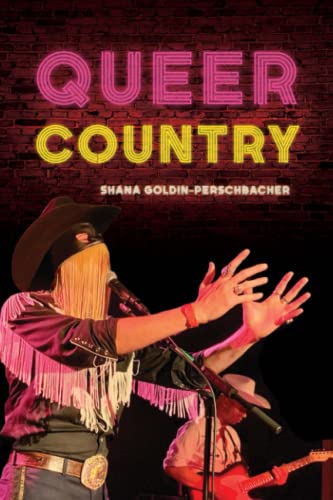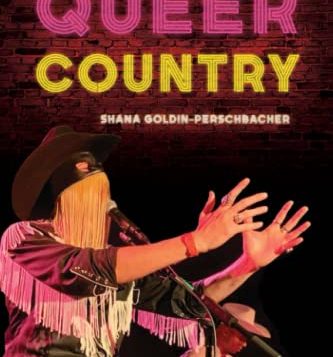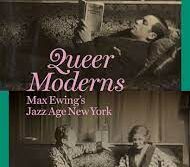
 QUEER COUNTRY
QUEER COUNTRY
by Shana Goldin-Perschbacher
University of Illinois Press. 288 pages, $24.95
USUALLY when one thinks about country music, what comes to mind is rural life or small-town America: cowboy hats and boots, beat-up pick-up trucks, God and country, conservative politics, heartbreak hotels, and honkytonks. What the world of country music is not known for is inclusive-ness of people (the urban, the nonwhite, the gay) who don’t possess these traits. In Queer Country, author Shana Goldin-Perschbacher, assistant professor of music studies at Temple University, discusses how this perception of intolerance has often made LGBT country-and-western fans feel unwelcome in the C&W scene (at least until recently).
That said, LGBT listeners have never been entirely excluded from enjoying C&W music and culture owing to the presence of what was once a small handful of LGBT artists and the songs they released. That early work, which was sometimes difficult for people to find, is where the roots of “queer country” lie, says Goldin-Perschbacher in this rather scholarly monograph. As it happens, this music is enjoying a kind of ren-aissance and is once again attracting both fans and performers in the LGBT community.
The first out lesbian to make a mark by embracing country music, Wilma Bur-gess, recorded some regional hits without pronouns in the early 1960s and opened Nashville’s first lesbian bar. More than a decade later, not long after Stonewall, Seattle artist Patrick Haggerty and his group Lavender Country released an eponymous album in 1973. Considered to be the first gay country album, Lavender Country was produced not by a mainstream label but by a local gay community center. It sold out, but mostly regionally. Because of profanity in one of the songs and the album’s references to gay life, parts of it were banned from airplay, but its popularity showed that there was a market for country music in the LGBT community.
In discussing the album, Haggerty has always insisted that his songs offer authenticity and truth in contrast to hiding one’s real identity. That, Goldin-Perschbacher argues, is something that’s central to queer country music. Mainstream country songs are all about heterosexual relationships and the lives of cisgender men and women; queer country should reflect authentic gay life.
Judging by the many kinds of country music that the author mentions in this book, there seems to be a label for almost every country song—although, somewhat surprisingly, she denies that “queer country” itself is a genre. Apparently it lies somewhere near the outskirts of the C&W world, with some artists preferring to identify with folk music or Americana. k.d. lang identifies as a country singer, but it appears that mainstream country begs to differ. Not that it matters a great deal: LGBT fans have sought out the music of k.d. lang and other artists regardless of what genre the record labels and music sellers have decided to use.
And yet, going mainstream remains a struggle. k.d. lang has had to overcome the mainstream media’s incorrect notions about her music and the belief that it’s a “spoof.” Early in her career, Chely Wright’s sexuality wasn’t even mentioned. After she came out, Nashville seemed to turn her away. Lil Nas X rose to stardom in a nontraditional way, by releasing his music on-line, but even he struggles with charting and acceptance in the world of country rap. The Grand Ole Opry doesn’t seem to be eager to embrace LGBTQ musicians or singers, although this lack of support may be ripe for change. As Goldin-Perschbacher points out in anecdotes from regional artists, hometown singers, and songwriters, collectively they have legions of die-hard fans who may force the issue of change, helped by growing audiences of LGBT people who’ve stumbled upon queer country and by cisgender audiences looking for something new.
Terri Schlichenmeyer is a freelance writer based in Wisconsin.





